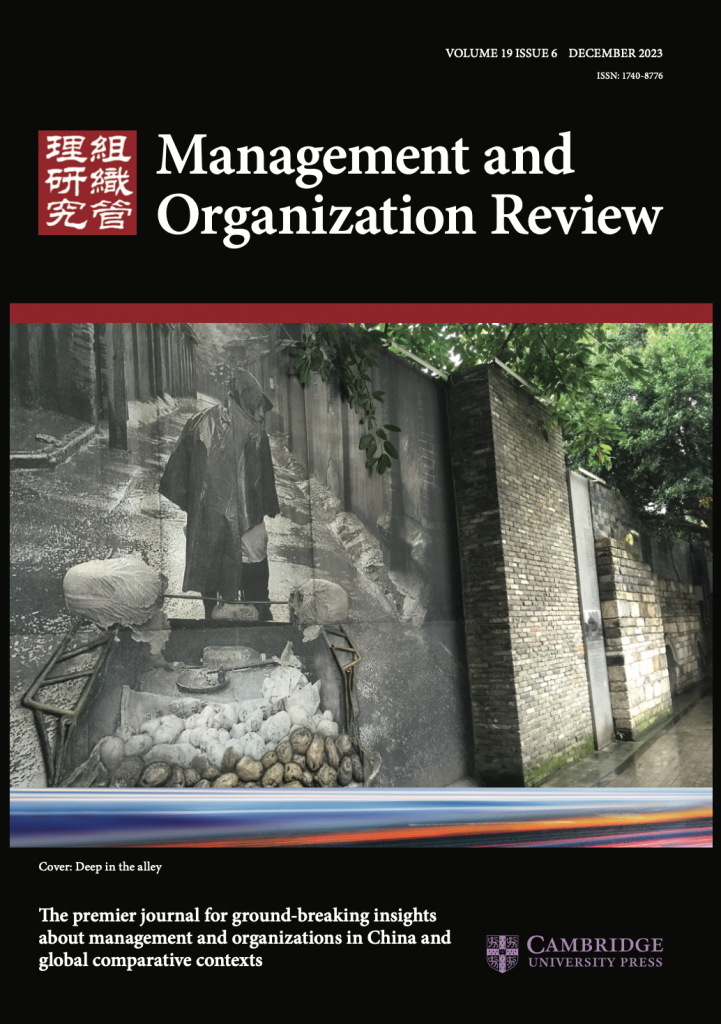MOR 19.6 Abstracts

Beyond the Western Conceptions with François Jullien: The Process of Leadership Informed by the Chinese Shi 勢 as Organizational Propensity
Feng Yue, Sybille Persson and David Wasieleski
Abstract
This conceptual paper examines the considerable scope of leadership theories built from literature originating in the West to focus on the ‘process’ of leadership. By opening the door to include traditional Chinese thought, the worldview of Western tradition is challenged using the work of philosopher and sinologist François Jullien. Chinese culture views process as the basis of transformation and renewal in the world. It is explained through ‘the propensity of things’ in relation to European ontology and causality. Recognizing the evolving nature of reality through the generic Chinese notion of shi 勢, which serves as a conceptual tool for Jullien, leadership process is understood as an aspect of organization propensity. Shi 勢 is then recognized as a leading force encompassing human agency that is able to open a new avenue for research nurturing the emerging quantum phase of leadership.
A Behavioral Account of Opportunistic Diversification: Evidence from Non-Real-Estate Firms’ Investment in Real Estate
Wei Shi,Wenjing Cai,Dennis Wajda and Fuxiu Jiang
Abstract
This study provides a behavioral account of opportunistic diversification. We argue that top executives’ social comparison with peer firms based on business segment performance can lead them to increase their investments in high-profitability new businesses (i.e., opportunistic diversification). Specifically, when the performance of a firm’s main business relative to its peer firms’ high-profitability business segment falls short of their aspirations, the firm’s top executives will engage in problemistic search and subsequently increase opportunistic diversification. This effect is stronger when the firm is similar to peer firms along key firm characteristics and when top executives of the firm are underpaid. Although opportunistic diversification helps improve a firm’s short-term accounting performance, it may weaken its long-term performance. Using Chinese non-real-estate firms’ diversification investment in real estate as our empirical context, we find support for our arguments.
Constrained by Localized Attention Focus: The Negative Effect of Firm-Specific Knowledge on Exploratory Firm Innovation
Bilian Ni Sullivan, Kaixian Mao and Heli Wang
Abstract
Integrating the resource-based view (RBV) and attention-based view (ABV), this study explores the impact of firm-specific knowledge (FSK) on a firm’s exploratory innovation and the role of government support in this process. We argue that firms with a high degree of specificity in their knowledge assets tend to have a more localized attention focus, leading to those firms with less exposure to distant and diverse information and knowledge. Consequently, such firms are likely to have reduced exploratory innovative outputs. However, government resource support could expand a firm’s attention focus beyond local searches, mitigating its negative effects. Based on a unique combined two-wave survey and archival data from over 500 firms in China, we find that the level of FSK is negatively related to a firm’s exploratory innovation output. We provide evidence that localized attention focus partially mediates the negative effect of FSK on firms’ exploratory innovation. We further reveal that state ownership and state financial support for firm innovation weaken the negative main effect. This study makes important contributions to the literatures on the RBV, FSK, and firm innovation.
A Dynamic Perspective on Job Knowledge Characteristics during the COVID-19 Pandemic
Jiping Li, Lida L. Zhang and Kaixian Mao
Abstract
Job knowledge characteristics have long been regarded as relatively fixed. However, this may no longer be the case given the dynamic and complex situations faced by employees during the COVID-19 pandemic. On the basis of event system theory and the work design literature, we argue that the onset of COVID-19 created an immediate decrease in job knowledge characteristics, which gradually increased over time in the post-onset period because of employees’ coping with the pandemic. The rate of increase in job knowledge characteristics is higher for those with higher individual task adaptivity than for others. We further argue that changes in job knowledge characteristics produced changes in job stress, and that this effect is weakened by job security. We conducted a 6-month, 6-wave longitudinal survey to gather data from 235 employees in Macau, China covering the pre-onset, onset, and post-onset periods of the COVID-19 outbreak. The results, based on discontinuous growth modeling and latent change score modeling, support our arguments. Our study advances the dynamic view of work design by identifying how a macro event may shape job knowledge characteristics and the implications of a time-to-time change in job knowledge characteristics. Overall, we suggest that there are psychological costs when employees cope at work with the business interruptions caused by COVID-19.
